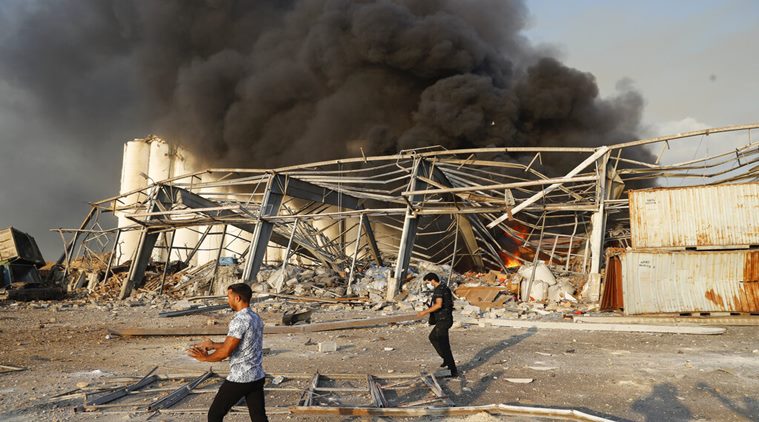 Massive explosions rocked downtown Beirut on Tuesday, flattening much of the port, damaging buildings and blowing out windows and doors as a giant mushroom cloud rose above the capital. (AP Photo/Hussein Malla)
Massive explosions rocked downtown Beirut on Tuesday, flattening much of the port, damaging buildings and blowing out windows and doors as a giant mushroom cloud rose above the capital. (AP Photo/Hussein Malla)
A 740-tonne consignment of ammonium nitrate lying at a Chennai port Customs warehouse since September 2015 has set alarm bells ringing after Tuesday’s catastrophic Beirut blast. An estimated 2,750-tonne stockpile of ammonium nitrate, stored reportedly for six years in a port warehouse, blew up killing over 100, injured over 5,000 and ravaged the Lebanese capital city.
Referring to this blast in a note, the Central Board of Indirect Taxes and Customs (CBIC) has “urgently directed” Customs and its field formations to “immediately verify and confirm within 48 hours that any hazardous and explosive material lying in warehouses and ports across the country meets all safety and fire standards and presents no danger to life and property.” After the Beirut blast, the Chennai stockpile, sources said, was the red flag for the alert. A senior Customs official said that “ways to shift out the ammonium nitrate at the earliest” are being explored.
“There’s some difficulty in taking action keeping safety regulations in mind. We are going through details. The e-auction will be conducted as per law…like for any other confiscated or seized goods or goods which are lying for a long time,” the official told The Indian Express.
The stockpile at Chennai port relates to a case involving the seizure of an import consignment of Karur-based Sri Amman Chemicals five years ago. The company had, in September 2015, filed for Customs clearance for the chemical packed in 37 containers, with the declared assessable value of Rs 1.80 crore claiming for use as fertiliser inputs.
The company claimed it had the required licence for the import while Customs authorities alleged misclassification and resultant evasion of duty after which the Madras High Court, in November 2019, ruled in favour of Customs authorities.
Result: the ammonium nitrate consignment continues to be stocked with Customs.
In a tweet Thursday, PMK leader S Ramadoss red-flagged this: “There is a risk of a similar explosion due to ammonium nitrate in the Chennai warehouse. To prevent this, the ammonium nitrate explosive substance in the warehouse should be safely disposed of and used for other purposes such as composting.”
In a statement Thursday evening, Chennai Customs said that the seized cargo is at a container freight station at Manali, 20 km from the city with no residential locality within 2 km. “The seized cargo is securely stored and safety of the cargo and the public is ensured considering the hazardous nature of the cargo…the disposal of the said cargo will be done within a short period, following all safety measures,” it said.
The Central government had, in July 2011, declared ammonium nitrate as an explosive under the Explosive Act, 1884, after which the CBIC issued Ammonium Nitrate Rules, 2012, for its import/export.
Import of ammonium nitrate — or any combination containing more than 45 per cent of ammonium nitrate by weight — including emulsions, suspensions, melts or gels (with or without inorganic nitrates), and classified under Explosives Act, 1884, is subject to license from Chief Controller of Explosives.
In the Chennai case, Customs said the company had just a P-3 licence for possession and sale of 1000 tonnes of the chemical but not the P-5 licence it needed for its import. Customs authorities also alleged that some actual users/firms to whom Sri Amman Chemicals sold ammonium nitrate were explosive dealers.
Queries e-mailed to Sri Amman Chemicals did not elicit a response.
In its petition in the Madras High Court, the company said that it had applied to the Chief Controller of Explosives, Petroleum & Explosives Safety Organisation (PESO) for a P3 licence which it got in December 2014.
It applied to PESO for a P5 licence in August 5, 2015. The company claimed that PESO, without putting it on notice or hearing its view, passed an order on August 19, 2015 rejecting its application but by then, the 740 metric tonnes of ammonium nitrate had already arrived at Chennai.
In its order, the court referred to explosions in various parts of the country in which ammonium nitrate was a common ingredient. It noted that as per the police, over four years since 2013, nearly 16,000 tonnes of ammonium nitrate went missing. The Court ruled that accumulating smaller quantities of ammonium nitrate would result in gathering larger quantities in the hands of “unknown and unidentifiable” persons and such trade would not be in interest of national security, adding that the authorities rightly rejected the claim of the company for a P5 licence.
Ammonium Nitrate is not an explosive by itself but is one of the ingredients used for manufacture of explosives. It is classified as an oxidizer as per UN classification for Dangerous Goods. Other ingredients like fuel, etc., have to be added to make it an explosive and for such explosive mixtures to explode, initiators like detonators are required.